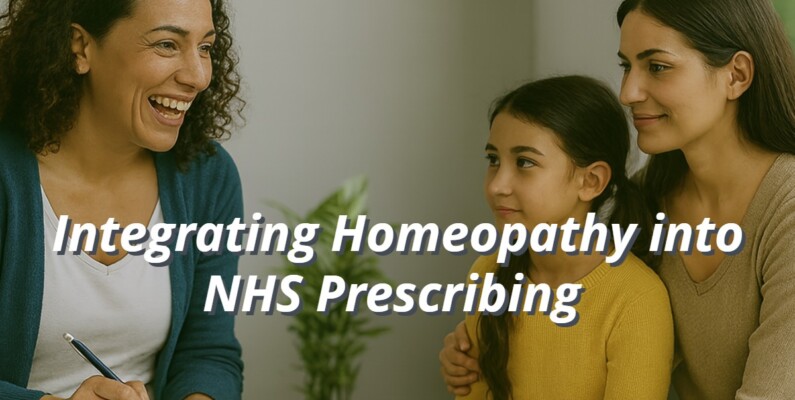The recent announcement by the UK government highlighting the significant benefits of nature-based prescriptions for mental health raises an essential question: If prescribing nature is proving so beneficial, why is the NHS not similarly endorsing homeopathy? With increasing evidence backing homeopathy as an effective adjunct treatment for depression and anxiety, the time has come for homeopathy to be embraced alongside nature prescriptions within NHS care.
Prescribing Nature is an NHS Success Story
In September 2024, the Guardian reported remarkable results from an NHS-backed pilot costing over £887,000 where some 8,000 participants engaged in nature-based activities. Activities included guided walks, gardening, wild swimming, and tree planting. Results indicated substantial improvements:
- Happiness scores increased significantly from 5.3 to 7.5 out of 10.
- Anxiety scores decreased from 4.8 to 3.4.
- Sense of life worth improved from 4.7 to 6.8.
Participants described these interventions as “better than medication,” highlighting nature prescribing’s success in improving mental wellbeing at approximately half the cost of traditional psychological therapies such as Cognitive Behavioural Therapy (CBT).
Homeopathy’s Comparable Impact Evidenced by UK Research
While nature-based prescribing is undoubtedly a positive step, it’s crucial to recognise other healthcare options already validated by rigorous research, such as homeopathy. The landmark UK-based cohort multiple randomised controlled trial by Viksveen et al. (2017), published in BMC Psychiatry, provides substantial evidence supporting homeopathy’s integration into mental health care within the NHS framework.
The study was a pragmatic, real-world NHS cohort multiple randomised controlled trial conducted within UK community mental health settings, involving 566 adults experiencing self-reported depression. Participants received homeopathic treatment alongside their usual NHS care, while the control group continued receiving standard NHS care alone.
Key Outcomes of the Homeopathy Study:
- Statistically significant reductions in depression scores (PHQ-9), with a clinically meaningful improvement persisting at 12 months.
- Comparable improvements in anxiety scores (GAD-7).
- No serious adverse events reported, demonstrating high safety and acceptability among patients.
This real-world evidence highlights that homeopathy effectively complements traditional NHS treatments, echoing the success and acceptability of nature prescribing.
Financial and Healthcare Benefits of Homeopathy
Integrating homeopathy into NHS prescribing options could significantly enhance the efficiency of mental health provision. Similar to nature prescribing, homeopathy provides a cost-effective solution by potentially reducing medication reliance, lowering healthcare utilisation, and alleviating pressures on NHS mental health services.
For example, nature-based prescribing incurs costs of approximately £500 per patient, compared to around £1,000 for a course of CBT. Homeopathy, with its similar pragmatic and individualised approach, offers comparable cost savings. Homeopathic treatments could also diminish side effects and improve overall patient satisfaction and compliance.
NHS Alignment: Holistic, Patient-Centred Care
Homeopathy aligns seamlessly with current NHS values, emphasising personalised, integrated, and non-pharmaceutical care. NHS England’s long-term strategy explicitly supports treatments that enhance patient autonomy, holistic wellbeing, and reduced medication dependence. Given these strategic priorities, integrating homeopathy alongside nature-based prescriptions would represent a coherent, forward-thinking approach to mental healthcare.
Addressing Common Misconceptions
Despite compelling evidence, scepticism about homeopathy often arises from misunderstandings regarding its scientific validity. Critics frequently highlight the lack of active pharmacological agents in homeopathic remedies. However, what matters clinically and practically is the demonstrated effectiveness of homeopathy in rigorous real-world studies, precisely what Viksveen’s research provides.
The NHS routinely adopts therapeutic approaches where the active mechanism involves both biological and psychosocial interactions—such as nature-based prescribing or counselling. Homeopathy similarly encapsulates this holistic therapeutic approach, providing demonstrable and measurable mental health benefits.
Steps Towards NHS Integration
To effectively incorporate homeopathy into NHS mental health prescribing, policymakers and NHS trusts could consider the following recommendations:
- Pilot NHS-funded Homeopathy Initiatives:
Initiating targeted pilot programmes similar to nature-based prescribing projects would provide additional evidence and build broader acceptance. - Integrate Homeopathy into Primary Care Pathways:
Similar to nature link workers, homeopaths could receive NHS referrals, ensuring patients access safe, regulated, and professional homeopathic care.
Conclusion: A Unified Approach for NHS Mental Health
If the NHS can successfully prescribe nature-based interventions, there is a clear and compelling rationale to incorporate homeopathy into mental health treatment strategies. Homeopathy offers the same patient-centred, holistic, and cost-effective benefits, with an increasing volume of evidence confirming its effectiveness and patient acceptability.
The challenge now is not whether homeopathy has merit – research clearly demonstrates it does – but whether NHS policy will embrace an integrated, holistic, and truly patient-centred approach. For the NHS, this means proactively exploring therapies such as homeopathy, thus meeting diverse patient needs while ensuring sustainable healthcare costs.
At Homeopathy International (HINT), we advocate for this inclusive approach to healthcare, calling for homeopathy’s integration into NHS care pathways. It’s time the NHS embraced homeopathy alongside nature prescribing as a standard, effective, and compassionate mental healthcare option.

